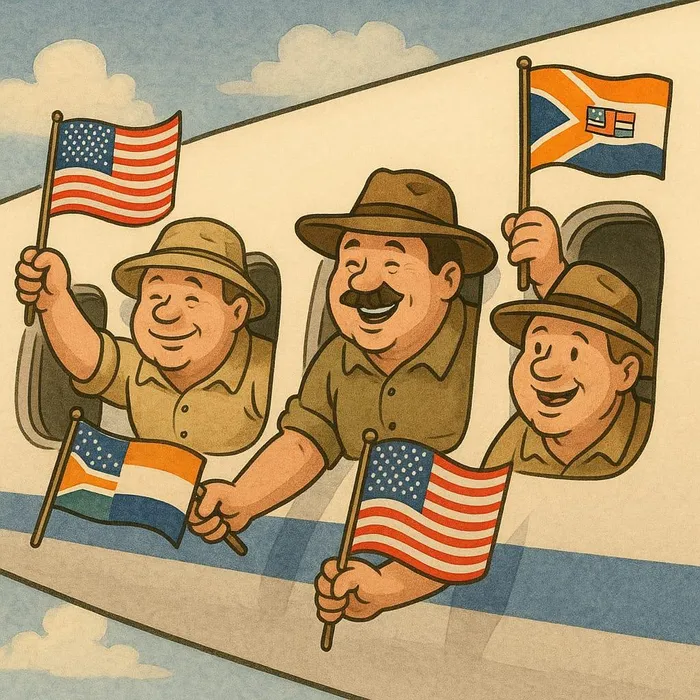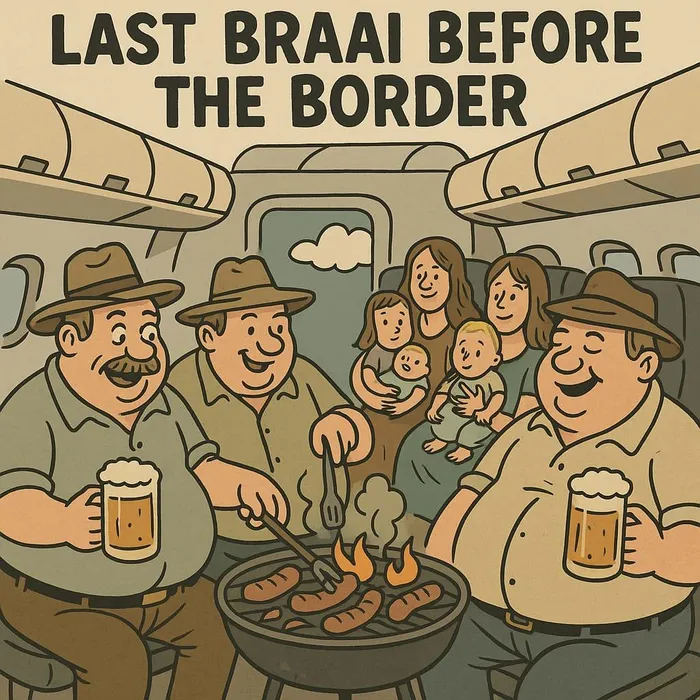
TikTok memes of Afrikaner panic distract from the real betrayal — the liberal white brain drain that quietly fled with privilege intact. Gillian Schutte exposes the projection economy of whiteness.
Image: Supplied
By Gillian Schutte
South African humour has once again taken root on TikTok: white migration parody. These aren’t real departure videos. They’re satires, staged and edited by mostly middle-class white South Africans depicting Afrikaner "refugees" exiting the country hoping for a whiter, brighter future in America.
In these clips, families from places like Brakpan or Boksburg pack up bakkies with Koo tins, whisper solemn goodbyes to their gardens, and strap confused boerbols into the front seat. A child in a Springbok jersey cries as the family heads for Texas. The captions read “Goodbye Ouma, Hello Walmart” or “Last Braai Before the Border.”
They mock the idea of white panic — but with a particular target: those visibly unsettled, unskilled, and poorly equipped for the post-apartheid world.
What the memes really parody — perhaps unintentionally — is a long-standing pattern of flight dressed up as foresight.
The title these meme-makers don’t always explain is The Great Tsek. Tsek, in township slang, is a riff on voetsek — the Afrikaans “get lost,” reinterpreted as f**k off. And this is precisely what has unfolded over the last 30 years: a long, layered, racially coded f**k-off from the promises of democracy.

TikTok memes of Afrikaner panic distract from the real betrayal — the liberal white brain drain that quietly fled with privilege intact. Gillian Schutte exposes the projection economy of whiteness.
Image: Supplied
The meme-makers themselves — often liberal whites living in Cape Town, Joburg’s loftier enclaves, or abroad — aren’t innocent observers. Besides appropriating a black term like they were its originators, they are, in many cases, the relatives of the original exodus: the liberal brain drain that quietly fled in the early 2000s.
Those earlier departures weren’t filmed. They were notarised.
The First Great Tsek involved no bakkies, no tears, no Steve Hofmeyr soundtracks. Just bank transfers, EU passports, elite university placements, and farewell brunches in suburbs soon renamed for foreign consulates.
These were the whites who had enthusiastically embraced the Mandela moment, benefited from post-apartheid appointments, property prices, and the glow of being progressive — and then left before transformation could rearrange the hierarchy too fully.
Now, sipping flat whites in Vancouver, Berlin, or Perth, they share the latest TikTok parody, laughing at the working class Brakpan family panicking at the threshold of irrelevance. “We’re not like them,” they say — from safe distances, in sanitised democracies.
But they are.
Their performance is more discreet. Their fear was just better funded.
This is textbook projection. Mock the thing you once were. Create distance from the part of yourself still invested in your fleeing.
And flee they all did — from Die Swart Gevaar.
No longer shouted through loudspeakers, the old apartheid fear now mutters itself into euphemisms: “service delivery,” “crime,” “we had no future there.” The fear wasn’t of violence — it was of governance. Of becoming irrelevant. Of no longer being the protagonist in the national story.
AfriForum, of course, recognised the panic for what it was — useful. Faced with the growing embarrassment of 40,000 impoverished Afrikaners — living in informal settlements, outside of the racial myth of white economic success — they rebranded them as refugees.
It was a clever narrative sleight of hand. The poor white problem became the persecuted white minority.
Enter Trump.
Primed by AfriForum’s curated crisis, he expected to rescue stoic farmers — rugged, land-owning, God-fearing Calvinists. What he got was a loose assortment of unskilled, economically displaced white South Africans hoping that whiteness still had trade value.
It did not.
They became punchlines again — this time in the American meme economy. “You’re not coming here to own land,” one creator quipped. “You’re here to mow it.” Others were more blunt: “You’re replacing the Mexicans,” and from Black American creators, “We won’t be washing your underwear.”
Meanwhile, the original liberal leavers remain untouched. They laugh from repurposed precincts in Melbourne or glassy co-working spaces in London. They repost the memes, relieved that someone else is now carrying the visible burden of white decline.
This is the theatre of displacement.
The poor white panic becomes a caricature. The liberal white exodus becomes invisible.
What unites them isn’t class or tone, but the impulse to tsjek.
The memes are funny. The imagined garden gnome goodbyes. The dramatics about Idaho and replacing Boxers with Walmart. But the real theatre happened earlier — in embassies, in bank offices, in the offshoring of conscience.
And Die Swart Gevaar, ever-morphing, ever-haunting, continues to animate both the satire and the silence.
South Africa is left with the consequences — a thinning middle class, an unfinished national project, and a meme economy that disguises historic betrayal.
And, in the end, whether they left with satire or suitcases, with Koo tins or capital gains, they all did the same thing:
They all f**ked off in the end.
* Gillian Schutte is a South African writer, filmmaker, and critical-race scholar known for her radical critiques of neoliberalism, whiteness, and donor-driven media. Her work centres African liberation, social justice, and revolutionary thought.
** The views expressed do not necessarily reflect the views of IOL or Independent Media.
Related Topics: